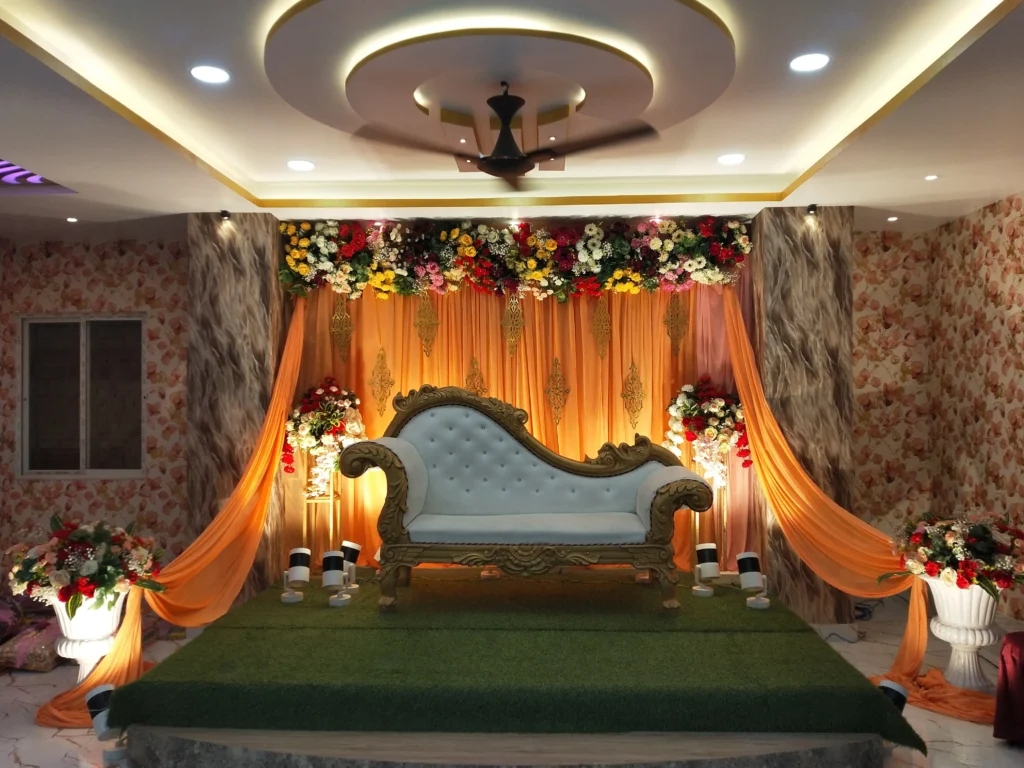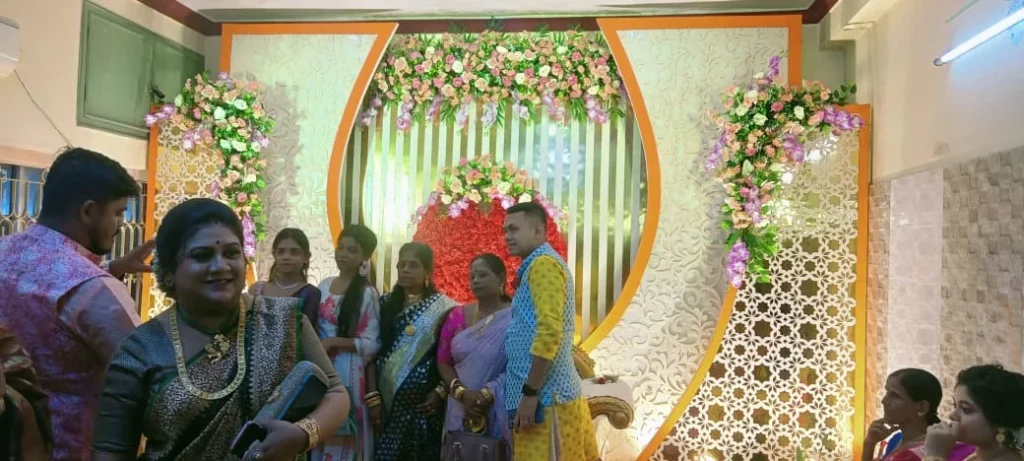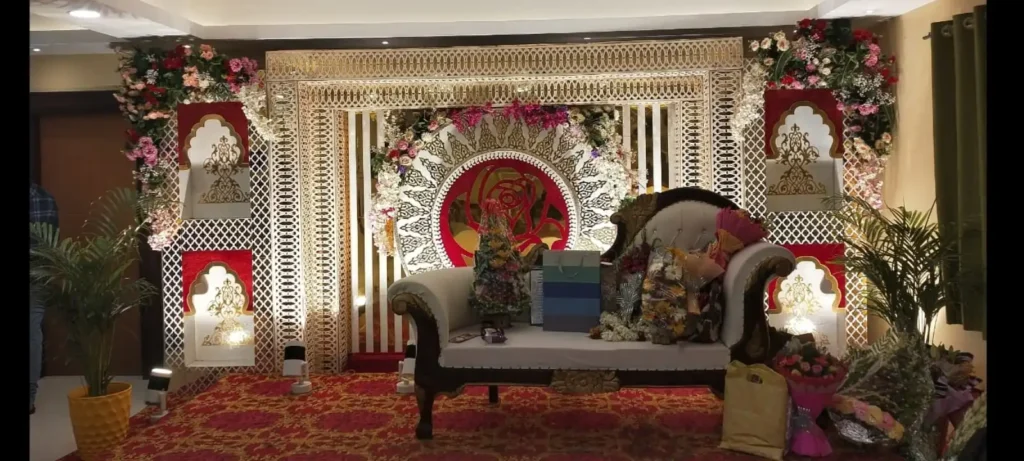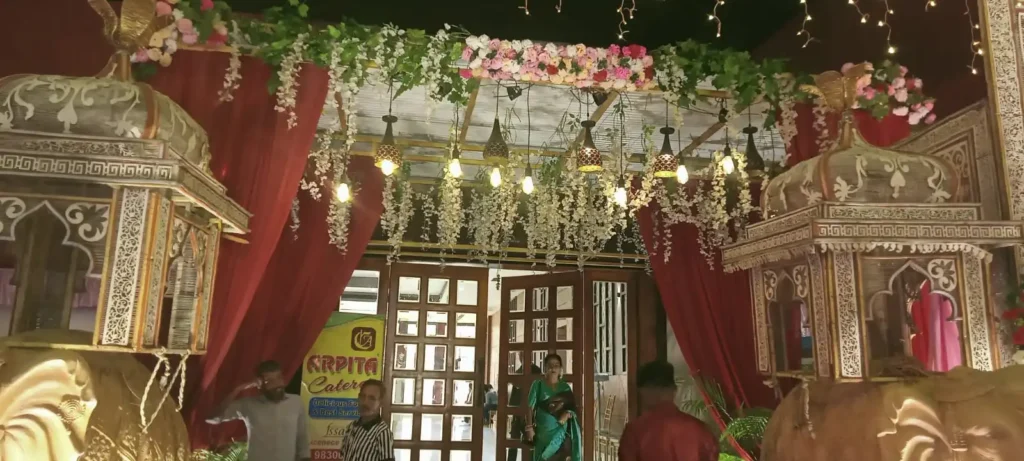A Kashmiri wedding is an exquisite blend of tradition, culture, and vibrant celebrations that are deeply rooted in history. The intricate rituals, rich cuisine, and lavish ceremonies make a Kashmiri wedding a truly remarkable affair. In this guide, we delve into the various aspects of a traditional Kashmiri wedding, from pre-wedding ceremonies to the grand reception, and explore the cultural significance behind each step.
1. Rasm-e-Ghar Wajjin:Kashmiri Wedding (The Beginning)

The wedding journey begins with the Rasm-e-Ghar Wajjin, a formal meeting between both families. Traditionally, the groom’s family visits the bride’s house with gifts, sweets, and fruits. It is during this event that the families discuss the kashmiri wedding arrangements and set the date for the ceremony. This gathering is warm, welcoming, and marks the official engagement of the couple.
2. Thap:Kashmiri Wedding (Engagement Ceremony)
Following the initial meeting, the engagement ceremony known as “Thap” takes place. The groom’s family visits the bride’s home with a set of gifts including a gold ring, clothes, and sweets for the bride. This ceremony is simple yet elegant and involves the exchange of rings. The families then offer a small prayer for the couple’s happiness and prosperity.
3. Wanwun: The Musical Evening
A Kashmiri wedding is incomplete without the musical celebrations called “Wanwun.” These are singing sessions organized separately at both the bride’s and groom’s houses. The women of the family gather to sing traditional songs that narrate folk tales, celebrate marital bliss, and invoke blessings for the couple. The Wanwun sessions continue throughout the wedding days, adding a melodious charm to the entire event.
4. Mehendi Ceremony:Kashmiri Wedding

The Mehendi ceremony, although common across many Indian cultures, holds a special place in Kashmiri weddings. The bride’s hands and feet are adorned with intricate henna designs symbolizing love, joy, and prosperity. This ceremony is usually accompanied by music, dance, and a festive spread of food. The darker the Mehendi color, the stronger the love between the bride and groom is believed to be.
5. Maenzraat: The Night of Rituals
The Maenzraat is a significant pre-wedding ritual that takes place at night, usually a day before the wedding. This event is filled with traditional customs and celebrations. The bride and groom are treated to a turmeric paste application, called “Haldi,” which is said to purify and bless them. This ceremony is followed by Wanwun, where family and friends come together to celebrate in high spirits.
6. Divgun: The Main Wedding Day
The Divgun is the main wedding day that is marked by grandeur and tradition. The groom arrives at the bride’s home accompanied by a procession known as the “Baraat.” Dressed in a traditional “Pheran” (a long gown) and adorned with a turban, the groom makes a grand entrance. Upon arrival, the bride’s family welcomes him with an “Aarti,” offering prayers and blessings.
7. Nikah Ceremony: in wedding plan (The Wedding Ritual)

The Nikah, the main wedding ritual, is conducted in the presence of a religious officiant called the “Qazi.” The bride and groom exchange vows and agree to the marriage by saying “Qubool Hai” (I accept). This ceremony is performed with great sanctity and is followed by the signing of the marriage contract. The Nikah is a soulful event that is often accompanied by Quranic recitations and blessings for the couple. but bengali wedding plan some different in india.
8. Posh Puza: The Sacred Blessing
Posh Puza is a unique Kashmiri ritual that involves the couple sitting together under a large shawl, while the Qazi and elders shower them with flowers, offering blessings and prayers for a happy married life. This tradition symbolizes the unity and prosperity of the newlyweds.
9. Wazwan: The Royal Feast
No Kashmiri wedding plan is complete without the elaborate Wazwan feast. This traditional multi-course meal is a hallmark of Kashmiri culture. Guests are served delicacies like “Rogan Josh,” “Goshtaba,” “Yakhni,” and “Tabak Maaz,” all prepared by specialized chefs called “Wazas.” The Wazwan is served in a large communal plate called “Traem,” symbolizing unity and togetherness. The feast reflects the hospitality and culinary richness of Kashmiri culture.
10. Rukhsati: in wedding plan, (The Farewell)
The Rukhsati marks the emotional farewell of the bride as she leaves her parental home to begin her new journey. The bride is accompanied by tears, prayers, and well-wishes from her family. This ceremony is often filled with heartfelt moments as the bride bids adieu to her loved ones.
11. Walima: Kashmiri Wedding (The Reception)

The Walima, or reception, is hosted by the groom’s family, usually a day after the wedding. This event is a joyous gathering where the couple is introduced to the community as newlyweds. Guests are treated to another lavish feast, and the event concludes with prayers and blessings for the couple’s future.
Conclusion
A Kashmiri wedding is a beautiful amalgamation of tradition, culture, and celebrations that bring together families and communities. From the soulful Wanwun songs to the rich flavors of the Wazwan feast, every aspect of a Kashmiri wedding plan is deeply rooted in culture and history. The meticulous planning and execution of these ceremonies reflect the richness of Kashmiri traditions, making it an unforgettable experience for everyone involved.

Nesine Futbol? Been there, done that! Solid platform for Turkish football fans. Easy to use, lots of updates. Check it out if you’re following the Süper Lig! nesinefutbol
Yo, 18betvip! I’ve been hitting this site up for a while now, and gotta say, it’s pretty decent. Good selection of games and some alright odds. Could be better, but hey, ain’t they all? Worth a shot if you’re looking for something new. Check it out here: 18betvip
Spinning the reels on 777win66 tonight. Fingers crossed for that lucky 7! Anyone else playing there? I am feeling lucky, check it out 777win66.
Crikey! Jumped onto tobet88vn for a few rounds. Fair dinkum, not bad. Loads of variety in the game offerings. The mobile experience could be smoother, though. Still, worth checking out: tobet88vn
Cheers mates! Gave 8qbetcom a shot and registration seemed to require a few extra details! After doing that, games seemed smooth to load and use. check it here: 8qbetcom
Hey there, thinking about testing the waters at 88fcbet. Any insights on their platform and game selection?
Vnz66bet, I checked out Vnz66bet the other day because I was bored. Not bad! Things are pretty nice here. Here’s the link if you wanna give it your opinion too: vnz66bet
Wynn09, Alright, I decided to try Wynn09 after seeing some ads, and things are nice here, easy to use. What are you waiting for? It’s here: wynn09
Kv99casino, had a bit of a session last week. UI’s pretty clean and the payouts were prompt. No complaints from me, really. Take a look: kv99casino